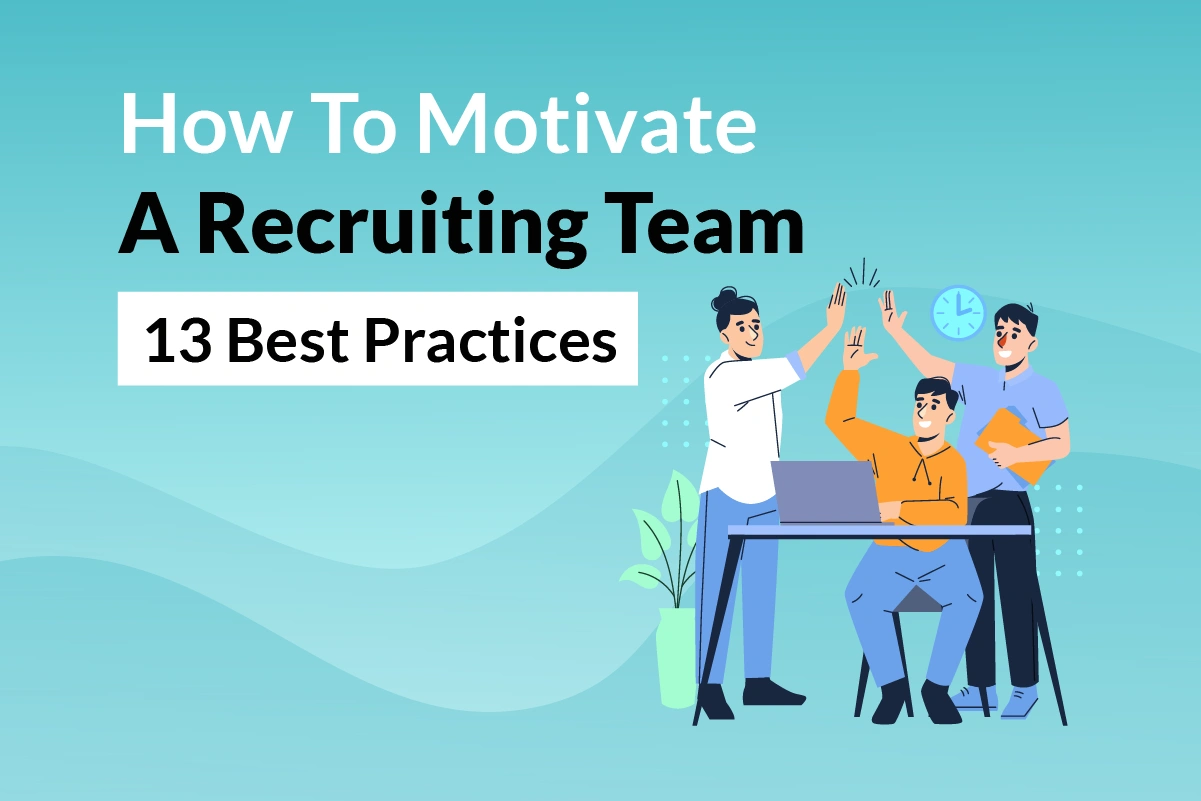In the fast-paced world of talent acquisition, the motivation and drive of your recruiting team are the heartbeats of success. “How to motivate a recruiting team?” is an exploration into unlocking potential and igniting the passion of unmatched talents. With this in mind, we’ve unveiled 13 best practices that are not only proven but are designed to inspire. Rooted in deep expertise and industry insights, these strategies are your keys to transforming the ordinary into the extraordinary.
- Setting Specific, Realistic Goals
- Creating a Positive Work Environment
- Offering Ongoing Educational Chances
- Promoting Work-Life Balance
- Investing In Team Health and Well-being
- Emphasizing Inclusivity and Variety in The Workplace
- Cultivating a Growth Mindset
- Providing a Clear Career Path
- The Power of an Energized Recruiting Team
Setting Specific, Realistic Goals
The power of motivation in recruitment is varied and begins with the principle of SMART goal-setting. Research from the revered Corporate Leadership Council highlights an impressive 275% uptick in achieved targets when implementing this approach, underscoring its monumental impact on recruitment. Let’s delve into its significance:
- Specific: Rather than casting a wide net, organizations should laser-focus on a candidate’s crucial skills. This strategy not only taps into a more expansive talent pool but also culminates in offers that truly resonate, leading to higher-quality hires.
- Measurable: In an era where data shapes decisions, the importance of key KPIs, such as cost-per-hire and time-to-hire, cannot be emphasized enough. These metrics serve as a North Star, ensuring alignment with overarching business aspirations.
- Achievable: Set goals that invigorate and challenge yet remain rooted in reality. A unique motivation derives from achieving well-set targets, leading to optimal resource use and a continually motivated recruitment team.
- Relevant: Candidates with diverse backgrounds can offer invaluable insights, even if they hail from different sectors. Recognizing and valuing relevance over exact titles ensure a richer and more varied talent intake.
- Time-bound: Implementing clear timelines for recruitment tasks, possibly facilitated by SLAs, introduces order and efficiency into the process. This ensures timely completions, from initial screenings to the final interviews.
Embracing the SMART framework is a commitment to the excellent path. It’s about setting clear objectives, continually recalibrating strategies, and aligning with the organization’s vision.
Creating a Positive Work Environment
Cultivating a positive work environment is the key to putting a smile on all your team members. Hence, having this in your organization will directly influence recruiter motivation, ensuring optimal performance.

Here’s a guide on enhancing the work environment:
- Prioritize the onboarding process: Help them learn about both the role and the company’s operational approach.
- Look after workers’ needs: Ensure they feel important and mentally happy.
- Talk to your team: Chat with them face-to-face. This shows you care and uplifts their morale.
- Celebrate special moments with heartfelt appreciation: Commend them for the years they’ve dedicated to learning, growing, or attaining new heights within the company.
Offering Ongoing Educational Chances
As organizations grapple with the challenges of attracting top-tier talent, the question that arises is “How to motivate recruiters effectively?”. One potent strategy lies in creating an environment of continuous learning.
- Providing access to learning: By offering tools and platforms for continuous learning, you empower employees to stay updated, making them assets in this dynamic recruitment arena.
- Help employees with individual learning plans: Personalized learning agendas enable employees to pinpoint and pursue their unique learning objectives, further driving motivation and skill acquisition.
- Periodic training: Regular training refines skills, ensuring recruiters remain at the apex of industry knowledge. As highlighted by IBM, such initiatives can bolster profit margins by a staggering 24%.
- Allocate time for education: Carving out dedicated time slots for education ensures that the pursuit of knowledge remains integral to your team’s routine.
- Encourage sharing and teamwork: When recruiters pool their insights, it amplifies individual knowledge and shapes an inclusive, enlightened team.
By embedding these practices, organizations can elevate recruiter motivation and position themselves at the forefront of recruitment innovation.
Promoting Work-Life Balance
In an era where the boundaries between personal and professional realms often blur, understanding the importance of work-life balance is indispensable.
Recruiters and employees often feel overwhelmed, exhausted, and tired. When recruiters constantly battle these feelings, the ripple effect touches every corner of an organization—from reducing productivity to rocketing turnover rates. Fret not, as the solution lies within reach.
Flexibility & Remote Work:
- Need for Flexibility: The modern recruiter demands adaptability. Whether flexible hours or the freedom of remote work, these are now core expectations, not mere privileges.
- Remote Work Benefits: Beyond preventing burnout, remote work can enhance job contentment, conserve hours spent in transit, and when done right, enhancement in productivity.
- Implementation: Transitioning to a flexible model is more than just giving a green signal to work from home. It requires empowering recruiters with collaborative tools, ranging from video conferencing platforms to comprehensive task management systems. Also, regular online meetings can help the team feel connected.
The atmosphere of heightened satisfaction, ingenuity, and allegiance is also formed by placing work-life balance at the heart of organizational strategy.
Investing In Team Health and Well-being
When it comes to motivation recruitment, the well-being of the recruiters plays a crucial role. A recruiter in good health is more likely to be productive and bring in quality candidates. Here’s how to support it:
- Offer flexible work hours and locations: Providing flexible work hours and locations paves the way for reduced stress and heightened job satisfaction.
- Treat well-being as a vital skill and measurable outcome: Recognize well-being as not just an essential skill but also a measurable outcome. This strategic move fortifies your workforce and translates into tangible business gains.
- Create a healthy work environment: Creating a healthy work environment elevates employee engagement and performance, directly impacting your company’s success.

Prioritizing these steps can lead to a happier and more efficient team.
Emphasizing Inclusivity and Variety in The Workplace
Championing diversity and inclusion in the workplace nurtures a culture where every individual’s uniqueness is valued. Such an environment enhances their well-being and job satisfaction. For businesses, this approach amplifies productivity, lowers staff turnover, and elevates the company’s image, making it an attractive place for unmatched talents.
Overall, prioritizing inclusion and diversity alongside work-life balance is essential for cultivating a vibrant and committed workforce, benefiting the staff and the organization.
Cultivating a Growth Mindset
Cultivating a growth mindset stands out as a top-tier strategy in the realm of motivation for recruiters. Encouraging employees to view mistakes as chances for growth forms a resilient and innovative mindset. Resilience and creative thinking flourish by establishing a workspace where individuals are unafraid to take risks and are motivated to derive insights from missteps.
Providing a Clear Career Path
Boosting recruiter motivation is utmost crucial, and a defined career path plays a remarkable role. By presenting a clear roadmap, recruiters gain insight into their professional journey and can envision their long-term position in the organization via:
- Set Clear Milestones: Clearly detail the phases and tasks at each level in the recruitment career, assisting recruiters in grasping their growth and the expertise needed at every stage.
- Offer Skill Development: Provide training, workshops, and mentorship programs to help recruiters enhance their skills and prepare for higher roles. Such investment refines their skill set and amplifies their professional confidence.
- Regular Performance Reviews: Uphold consistent performance reviews, ensuring constructive feedback and a strategic blueprint for growth.

All in all, by heeding these 13 best practices, businesses can ensure their recruiters are not only equipped but also inspired to find the best candidates.
The Power of an Energized Recruiting Team
Understanding how to motivate a recruiting team is the backbone of any organization’s talent acquisition strategy. By embracing these 13 best practices, you’re lighting a spark that attracts top talents. The right motivation can transform your recruiting process, drawing in individuals who align perfectly with your vision.
Are you ready to set a new thrive? Begin with Boulo Solutions by prioritizing your team’s motivation and experience the remarkable transformation in your hiring results. Take the next step and inspire your team to unparalleled success by reaching out to us!

